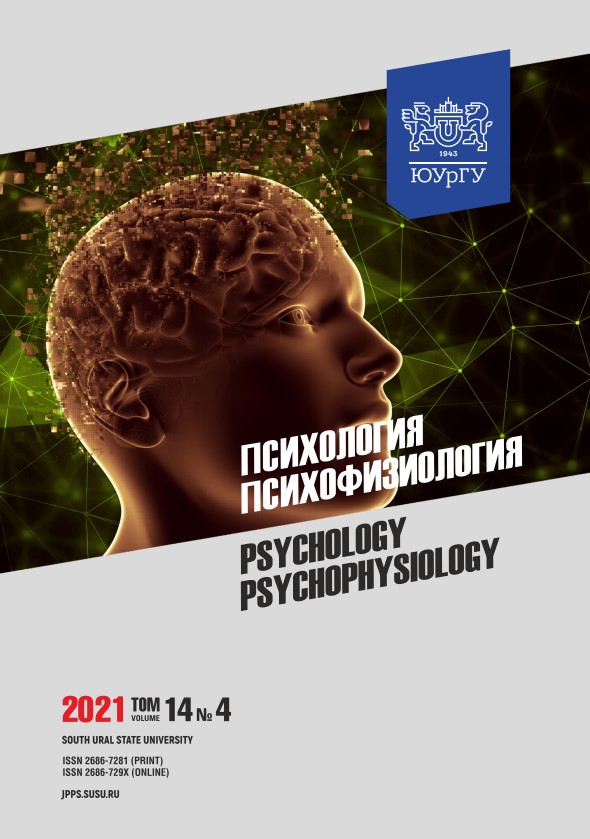PERSONAL FEATURES AND INTRA-FAMILY RELATIONSHIPS OF MEN WITH DIFFERENT REPRODUCTIVE STATUS
Abstract
Abstract. The role of the father in the development of a fully functioning person is not less significant than that of the mother. The father influences the gender identification of children and their interest in learning, contributes to the development of moral norms. Moreover, fatherhood serves as role model behavior for children as potential parents. Despite the high research interest in the concept of fatherhood, there is a number of issues that require additional research. The aim of this paper is to identify the personality traits, parenting competencies, and marital attitudes of future fathers (physiological pregnancy and pregnancy associated with assisted reproductive technologies (ART)). Materials and Methods. Two groups of males with different reproductive histories expecting a child were formed for a comprehensive psychological study. The first group (n = 73) consisted of men whose spouses were pregnant after the use of ART. The second group (n = 70) consisted of men whose spouses became pregnant naturally. The study design included a semi-structured interview and a number of methods. Quantitative and qualitative analysis was conducted to process the results. The data obtained were analyzed using the R language in the RStudio Version 1.3.1093 program. Results. Our analysis showed statistically significant differences between the two groups of men on a number of scales from the Freiburg Personality Inventory (FPI) and the Role Expectations and Aspirations in Marriage Questionnaire. Less significant differences were found in terms of the results of the Conscious Parenting Questionnaire, the Sex Role Inventory, and interview questions. Conclusion. Despite changing gender stereotypes in our country, the dominant role in having and raising a child is attributed to a woman. The dominant psychological gender in both groups is androgyny. The analysis of interview answers showed the necessity of preventive measures. The analysis of personality traits showed the prevalence of affective reactions in the first group accompanied by depressive mood and introversion.
Downloads
References
2. Volling B.L., Palkovitz R. Fathering: New perspectives, paradigms, and possibilities. Psychology of Men & Masculinities. 2021;22(3):427–432. DOI: 10.1037/men0000354
3. Abraham E., Feldman R. The neurobiology of human allomaternal care; implications for fathering, coparenting, and childrens social development. Physiology and Behavior. 2018;193:25–34. DOI: 10.1016/j.physbeh.2017.12.034.
4. Borisenko Yu.V. [Specificity of value attitude towards paternity of children of engaged and non-engaged fathers]. Izvestiya Irkutskogo gosudarstvennogo universiteta. Seriya: Psikhologiya = The bulletin of Irkutsk state university. Series. Psychology. 2018;24:23–33. (in Russ.). DOI: 10.26516/2304-1226.2018.24.23.
5. Bell L., Herrig R., Annahad F. Fathers and substance misuse: a literature review. Drugs and Alcohol Today. 2020;20(4):353–369. DOI: 10.1108/DAT-06-2020-0037
6. Barinova E.S., Vasyagina N.N. [Family Consciousness of Men as Individual Psychological Reality]. Vestnik Yuzhno-Uralskogo gosudarstvennogo universiteta. Seriya: Psikhologiya = Bulletin of the South Ural State University. Ser. Psychology. 2019;12(1):5–15. (in Russ.). DOI: 10.14529/psy190101.
7. Karymova O.S. [Some socio-psychological features of the reproductive attitude of a modern man]. Sovremennye naukoemkie tekhnologii = Modern high technologies. 2016;2:344–348. (in Russ.).
8. Shorey S., Ang L. Experiences, needs, and perceptions of paternal involvement during the first year after their infants birth: A meta-synthesis. PLoS ONE. 2019;14(1):2019. DOI: 10.1371/journal.pone.0210388
9. Allport B.S., Johnson S., Aqil A., Labrique A., Nelson T., A. Kc., Carabas Y., Marcell A.B. Promoting Father Involvement for Child and Family Health. Academic Pediatrics. 2018;(18):746–753. DOI: 10.1016/j.acap.2018.03.011.
10. Schoppe-Sullivan S.J., Shafer K., Olofson E.L., Kamp Dush C.M. Fathers parenting and coparenting behavior in dual-earner families: Contributions of traditional masculinity, father nurturing role beliefs, and maternal gate closing. Psychology of Men & Masculinities. 2021;22(3)538–550. DOI: 10.1037/men0000336
11. Guthauser B., Boitrelle F., Plat A., Thiercelin N., Vialard F. Chronic excessive alcohol consumption and male fertility: a case report on reversible azoospermia and a literature review. Alcohol. 2014;49(1). DOI: 10.1093/alcalc/agt133.
12. Ovcharova R.V., Tokareva Yu.A. [Scientific prerequisites for the analysis of the problem of fatherhood as an educational activity]. Nauka i obrazovanie Zauralya = Science and education of the Trans-Urals. 2005;1:30–40. (in Russ.).
13. Sukharevа I.A., Gizatullina G.R. [Modern view of men on the problem of paternity]. Tavricheskii mediko-biologicheskii vestnik = Tauride Medico-Biological Bulletin. 2018;3:97–101. (in Russ.).
14. Pleck J.H., Lamb M.E. Paternal involvement: revised conceptualization and theoretical linkages with child outcomes and paternal involvement: levels, sources, and consequences. The role of the father in child development. NY: Wiley. 2010:58–93. DOI: 10.1080/03004430.2012.723442.
15. Gamidov S.I., Ovchinnikov R.I., Popova A.Yu., Naumov N.P., Gasanov N.G. [Role of male infertility in assisted reproductive technology programs (a literature review)]. Andrologiya i genitalnaya khirurgiya = Andrology and Genital Surgery. 2017;18(3):28–36. (in Russ.).
16. Nicolau P., Miralpeix E., Solà I., Carreras R., Checa M.A. Alcohol consumption and in vitro fertilization: a review of the literature. Gynecological Endocrinology. 2014;30(11):759-763. DOI: 10.3109/09513590.2014.938623
References on translit
-Copyright (c) 2021 Psychology. Psychophysiology

This work is licensed under a Creative Commons Attribution-NonCommercial-NoDerivatives 4.0 International License.



